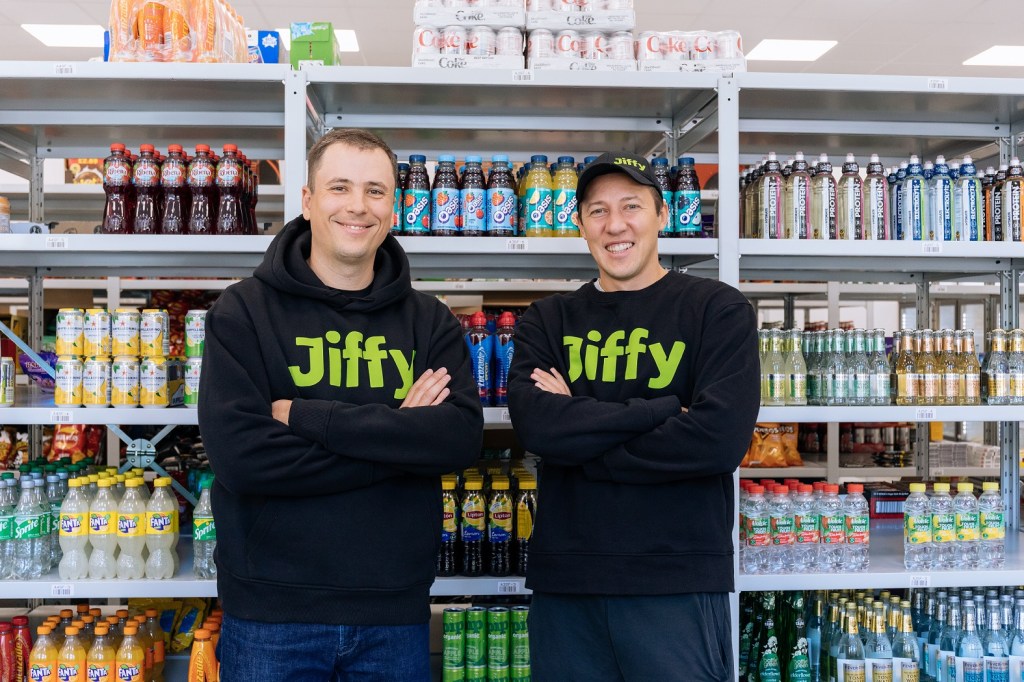Well that was fast. London grocery delivery upstart, Jiffy — which was only founded in April this year — has nabbed $28 million in Series A funding around half a year after initial £2.6 million seed raise. It says it’s now raised a total of $35 million.
The grocery delivery startup operates a network of its own dark stores to do fulfilment — enabling it to offer the promise of “fresh groceries in 15 minutes.”
Currently it has eight London stores — now with the funds to expand.
Jiffy tells TechCrunch it is has amassed around 20,000 customers so far across its six delivery zones (all in London for now).
The Series A round is led by family-owned investment company Heartland, with Boston-based international VC fund Flint Capital also participating, along with the Family Office of the Bukhman brothers — the founders of gaming company Playrix — and existing investors Baring Vostok Capital Partners and LVL1 among others.
The fast following financing is a measure of how hypercompetitive the on-demand grocery space has become in the U.K. capital — as well as being a clear signal investors are impressed with the startup’s early execution.
Other on-demand grocery delivery players operating in London include Gorillas, Weezy, Getir and Zapp. The U.S. unicorn Gopuff is also in the mix — having acquired U.K. startups Fancy and Dija.
Jiffy’s founders describe themselves as “q-Commerce veterans.” Co-founder and co-CEO Vladimir Kholiaznikov was ex-CEO of Russia’s e-grocery player X5 Food Tech, while fellow co-founder, Artur Shamalov (co-CEO), has also founded a previous food-related startup in Russia. Both have also dabbled in investing themselves — so likely have a burgeoning contacts book to tap when they go fundraising.
Other co-founders include Igor Demishev (CTO); Marat Balatov (platform director); and Oleg Naumov (performance marketing director).
Jiffy says its typical customers are families and middle-aged grocery shoppers who are switching to its app from traditional convenience supermarkets and online weekly shops. “We are betting this trend will only accelerate as we become a more mature service,” says Kholiaznikov.
The Series A funds will go on expansion within London — and maybe also further afield, as Jiffy eyes moving into other urban locations in the U.K.
“We are definitely aiming to cover London inside of the M4 by end of the year,” Kholiaznikov tells TechCrunch. “Jiffy might move to towns as a pilot this year but we will see later.”
The “long-term” plan is that “all towns with 100,000+ population are on our radar,” he adds.
“We are building a nationwide company but will also explore other markets though an alternative route — we are providing our q-commerce tech platform to selected local players in international markets (for example, we are a partner of Send in Australia),” Kholiaznikov also says, adding: “We will continue this route as well to add value to our core business and shareholders.”
While there is a smorgasbord of startups vying to deliver groceries and/or snacks to city dwellers in the U.K., Jiffy’s offer puts speedy delivery of fresh produce front and center, which looks like a smart differentiation versus operators that mostly want to ship easy-to-handle produce like bottles of pop and crisps.
Additionally, though, there are a raft of food delivery apps also trying to nibble into the traditional weekly grocery shop — very familiar names like Deliveroo, JustEat and Uber Eats — mostly focused on meal delivery from restaurants but some have been bolting on light groceries picked from stores they don’t operate.
Going after the full weekly grocery shop, as Jiffy and multiple other startups are, looks like a bigger logistics and execution challenge — certainly with a promise of 15-minute delivery — but also has the potential to be a more sustainable and lucrative business versus just catering to sporadic convenience needs and snack cravings, even if the ops are more complicated.
At the same time, there are not only startup rivals for Jiffy and company to worry about here; traditional supermarkets have made huge profits during the pandemic — and could certainly splash plenty of cash to dial up their delivery services. But this is also where leaner startups can steal a march by delivering on their promise of hyperfast delivery, albeit with less product choice.
In addition to grocery delivery, Jiffy is adding “Click & Collect” ordering — which is currently offered at two of its London stores, giving its customers more choice about how they get their groceries.
It is also avoiding the myriad (legal, ethical, reputational and logistical) pitfalls of gig work; its e-bike and moped-riding delivery couriers are liveried employees.
Another differentiating twist to its model is the aforementioned open q-commerce play.
“This means, we provide our ready-to-go IT platform that other companies can use to launch their own quick-commerce stores,” notes Kholiaznikov.
Commenting on Jiffy’s Series A in a statement, Lise Kaae, CEO of Heartland said: “The Jiffy team has managed to impress us with their ambitious plans and effective execution, and we are excited about the journey ahead operating in a highly dynamic and exciting growth market.”
Baring added: “We strongly believe in the large and untapped potential of the e-groceries market in the UK and the ultra-fast delivery business model developed by Jiffy. The company is led by a very experienced team of founders and the current round would enable Jiffy to further accelerate the growth. We are glad that the fund of Baring Vostok is a part of this exciting story.”
This report was updated with a clarification; we were initially told the gaming firm Playrix was investing in Jiffy’s Series A — but it’s actually the Family Office of the Bukhman brothers, the founders of Playrix. We also added in detail about Jiffy’s other co-founders and all their respective job titles
London’s Jiffy picks up £2.6M seed to enter the grocery dark store race































Comment